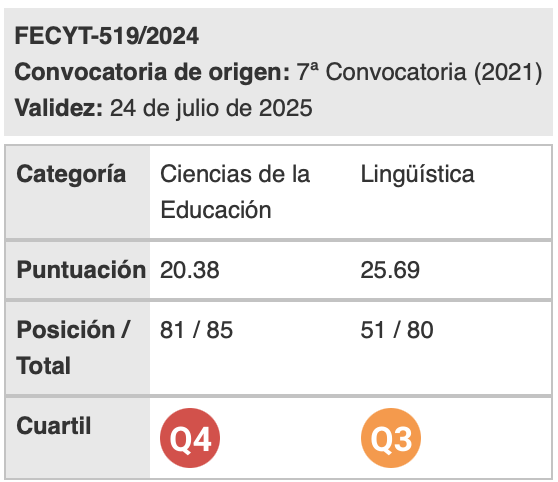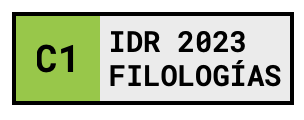Pre-service teachers’ experiences offering ESP courses to music and literature university students in Mexico
Keywords:
teacher education, language teaching, English for Specific Purposes, applied research, reflective practiceAbstract
The BA in Teaching English at the University of Guanajuato trains future teachers of English as a Foreign Language (EFL). Two fresh graduates of the program conducted an action-research project in English for Specific Purposes (ESP) in which they taught English to undergraduate students of music and literature, respectively, as part of their internship and for their BA dissertation. The main objective of this current study is to explore their teaching experience through reflection on the design and implementation of the courses they taught. The thematic analysis of the data collected through in-depth semi-structured interviews revealed that, while the participants enjoyed giving the sessions due to their own affinity with the area they were teaching in, the BA program could benefit from the inclusion of a subject on teaching ESP.
Downloads
References
Allwright, J. y Allwright, R. (1977). An approach to the teaching of medical English. En S. Holden (ed.) English for specific purposes (pp. 58-62). Modern English Publications.
Anthony, L. (2018). Introducing English for specific purposes. Routledge.
Agustín Llach, P. (2007). Teaching language through literature: The “Waste land” in the ESL classroom. Odisea [Revista electrónica], 8. <https://pdfs.semanticscholar.org/0fcf/2a24137db90f3d9f4d56895b3dd8c5cf8b16.pdf> [13/07/2021]
Bargiela-Chiappini, F., y Zhang, Z. (2013). Chapter 10: Business English. En B. Paltridge y S. Starfield (ed.) The handbook of English for specific purposes (pp. 193-211). John Wiley & Sons.
Barkhuizen, G. (2014). Revisiting narrative frames: An instrument for investigating language teaching and learning. System, 47, 12-27.
Basturkmen, H. (2010). Developing courses in English for specific purposes. Palgrave Macmillan.
Basturkmen, H. (2018). Needs analysis and syllabus design for language for specific purposes. The encyclopedia of applied linguistics, 1-8. <https://doi.org/10.1002/9781405198431.wbeal0861.pub2> [24/07/2021]
Bellés-Calvera, L. (2018). Teaching music in English: A content-based instruction model in secondary education. Latin American Journal of Content and Language Integrated Learning, 11(1), 109-139. < https://doi.org/10.5294/laclil.2018.11.1.6> [24/07/2021]
Bieswanger, M. (2016). Aviation English: Two distinct specialised registers? En C. Schubert, y C. Sanchez-Stockhammer (ed.) Variational text linguistics revisiting register in English (pp. 67-86). De Gruyter.
Brinkmann, S. (2014). Unstructured and semi-structured. En P. Leavy (ed.) The Oxford handbook of qualitative research (pp. 277-299). Oxford University Press.
Brown, J. D. (2016). Introducing needs analysis and English for specific purposes. Routledge.
Campbell, J. L., Quincy, C., Osserman, J., y Pedersen, O. K. (2013). Coding in-depth semi-structured interviews: Problems of unitization and intercoder reliability and agreement. Sociological Methods and Research, 42(3), 294–320. < https://doi.org/10.1177/0049124113500475> [24/07/2021]
Charles, M. (2013). Chapter 7: English for academic purposes. En B. Paltridge y S. Starfield (ed.) The handbook of English for specific purposes (pp. 137-153). John Wiley & Sons.
Clandinin, D. J., & Connelly, F. M. (2004). Narrative inquiry: Experience and story in qualitative research. John Wiley & Sons.
Clandinin, D. J., Pushor, D., & Orr, A. M. (2007). Navigating sites for narrative inquiry. Journal of teacher education, 58(1), 21-35.
Clark, E., & McCann, T. V. (2005). Researching students: an ethical dilemma. Nurse Researcher, 12(3).
Comer, S. K. (2009). The ethics of conducting educational research on your own students. Journal of Nursing Law, 13(4), 100-105. < https://doi.org/10.1891/1073-7472.13.4.100> [24/07/2021]
Connelly, F. M., & Clandinin, D. J. (1990). Stories of experience and narrative inquiry. Educational researcher, 19(5), 2-14.
Dandridge Bosher, S. (2008). English for nursing academic skills. The University of Michigan Press.
Dandridge Bosher, S. (2011). Acquiring discipline-specific literacy in a second language: A case study of an ESL nursing student. Taiwan International ESP Journal, 2, 17-48. < https://doi.org/10.6706%2fTIESPJ.2010.2.2.2> [24/07/2021]
Dandridge Bosher, S. (2013). Chapter 14: English for nursing. En B. Paltridge y S. Starfield (ed.) The handbook of English for specific purposes (pp. 263-281). John Wiley & Sons.
Dudley-Evans, T., y St. John, M. J. (1998). Developments in English for specific purposes: A multi-disciplinary approach. Cambridge University Press.
Emelyanova, T. V. (2017). Peculiarities of teaching legal English in multinational groups. Procedia-Social and Behavioral Sciences, 237, 1494-1499. < https://doi.org/10.1016/j.sbspro.2017.02.235> [06/04/2021]
Emery, H. J. (2014). Developments in LSP testing 30 years on? The case of aviation English. Language Assessment Quarterly, 11(2), 198-215. <https://doi.org/10.1080/15434303.2014.894516> [24/07/2021]
Estival, D., Farris, C., y Molesworth, B. (2016). Aviation English: A lingua franca for pilots and air traffic controllers. Routledge.
Ferguson, G. (2013). Chapter 13: English for medical purposes. En B. Paltridge y S. Starfield (ed.) The handbook of English for specific purposes (pp. 243-262). John Wiley & Sons.
Flick, U. (2007). Introducción a la investigación cualitativa. Morata.
Flowerdew, J. (2013). Chapter 16: English for research and publication purposes. En B. Paltridge y S. Starfield (ed.) The handbook of English for specific purposes (pp. 300-321). John Wiley & Sons.
Flowerdew, J. (2014). Academic discourse. Routledge.
Folgueiras Bertomeu, P. (2016). Técnica de recogida de información: La entrevista. Documento de trabajo. <http://diposit.ub.edu/dspace/bitstream/2445/99003/1/entrevista%20pf.pdf> [25/06/2022]
Galloway, N., Kriukow, J., & Numajiri, T. (2017). Internationalisation, higher education and the growing demand for English: An investigation into the English medium of instruction (EMI) movement in China and Japan.
Gómez de Enterría Sánchez, J. (2009). El español lengua de especialidad: enseñanza y aprendizaje. Arcos/Libros.
Granero Navarro, A. (2017). La literatura en el aula de ELE. En Consejería de Educación de España, Secciones Bilingües [Revista electrónica] 64-71. <https://cvc.cervantes.es/ensenanza/biblioteca_ele/publicaciones_centros/PDF/sofia_2017/07_granero.pdf> [05/06/2021].
Haigh, R. (2018). Legal English. Routledge.
Handford, M. (2010). The language of business meetings. Cambridge University Press.
Hernández-Sampieri, R., y Mendoza, C. (2018). Metodología de la investigación: las rutas cuantitativa, cualitativa y mixta. McGraw Hill México.
Hutchinson, T., y Waters, A. (1984). How communicative is ESP? ELT journal, 38(2), 108-113. <https://doi.org/10.1093/elt/38.2.108> [24/07/2021]
Hutchinson, T., y Waters, A. (1987). English for specific purposes. A learning-centred approach. Cambridge University Press.
Hyland, K. (2006). English for academic purposes: An advanced resource book. Routledge.
Hyland, K. (2013). Chapter 5: ESP and writing. En B. Paltridge y S. Starfield (ed.) The handbook of English for specific purposes (pp. 95-113). John Wiley & Sons.
Hyland, K. (2015). Teaching and researching writing. Routledge.
Hyland, K., y Hamp-Lyons, L. (2002). EAP: Issues and directions. Journal of English for Academic Purposes, 1(1), 1-12. <https://doi.org/10.1016/S1475-1585(02)00002-4> [24/07/2021]
Ilie, C., Nickerson, C., y Planken, B. (2019). Teaching business discourse. Palgrave Macmillan.
Jiménez Calderón, F. (2010). El texto literario en la enseñanza-aprendizaje de ELE a partir del paradigma PCPP. Marco ELE, Revista Didáctica como Lengua Extranjera [Revista electrónica], 17, 1-11. <https://marcoele.com/descargas/17/jimenez-texto_literario.pdf> [03/08/2021].
Johnson, K. E., & Golombek, P. R. (2011). The transformative power of narrative in second language teacher education. Tesol Quarterly, 45(3), 486-509.
Jouini, K. (2008). El texto literario en la clase de español como lengua extranjera: propuestas y modelos de uso. Íkala, Revista de Lenguaje y Cultura [Revista electrónica], 13(20), 121-159. <https://www.redalyc.org/pdf/2550/255020456005.pdf> [25/08/2021].
Kim, H. (2018). What constitutes professional communication in aviation: Is language proficiency enough for testing purposes? Language Testing, 35(3), 403-426. <https://doi.org/10.1177%2F0265532218758127> [24/07/2021]
Kovačević, D. (2015). Chapter one: Texts on (classical) music and some aspects of their use in teaching ESP at the Academy of Music. En N. Stojković (ed.) Vistas of English for specific purposes (pp. 3-10). Cambridge Scholars Publishing.
Kovačević, D. (2017). Contrastive linguistic analysis of texts on classical music in English and Serbian and its possible applications in professional environment and ESP. Journal of Teaching English for Specific and Academic Purposes, 5(1), 35-48. <https://doi.org/10.22190/JTESAP1701035K> [24/07/2021]
Kovačević, D. (2018). Pedagogical conceptualisation of content knowledge in teaching art music related ESP. Journal of Teaching English for Specific and Academic Purposes, 6(3), 333-339. <https://doi.org/10.22190/JTESAP1803333K> [24/07/2021]
Lesiak-Bielawska, E. D. (2015). The role of discipline-specific knowledge in ESP teaching, English for Specific Purposes World [Revista electrónica], 47, 1-15. <https://bit.ly/3kiO0ac> [17/07/2021].
Limbrick, L., Buchanan, P., Goodwin, M., & Schwarcz, H. (2010). Doing things differently: The outcomes of teachers researching their own practice in teaching writing. Canadian Journal of Education, 33(4), 897-924.
López Prats, E. (2009). El texto literario en el aula de Español como Lengua Extranjera. Propuesta de programación didáctica: Últimas tardes con Teresa, de Juan Marsé. (Tesis de grado inédita). Universidad de Girona. <https://dugi-doc.udg.edu//bitstream/handle/10256/1507/Lopez_Prats_Encarna.pdf?sequence=1> [24/07/2021]
Lortie, D. (1975). Schoolteacher. A sociological study. University of Chicago Press.
Mann, S. (2010). A critical review of qualitative interviews in applied linguistics. Applied Linguistics [Revista electrónica], 32(1), 6-24. <https://doi.org/10.1093/applin/amq043> [24/07/2021]
Mann, S., y Walsh, S. (2017). Reflective practice in English language teaching: Research-based principles and practices. Routledge.
Maqueo, A. M. (2009). Lengua, aprendizaje y enseñanza. Limusa.
Mason, J. (2002). Qualitative researching. SAGE Publications.
McGinn, M. K. (2018). Teaching and Researching Ethically: Guidance for Instructor-Researchers, Educational Developers, and Research Ethics Personnel. Canadian Journal for the Scholarship of Teaching and Learning, 9(1), n1.
McKay, S. (2020). Literature as content for language teaching. En M. Celce-Murcia, D. M. Brinton, y M. A. Snow (ed.), Teaching English as a second or foreign language (pp. 488-500). Heinle ELT.
Miller, T., Birch, M., Mauthner, M., y Jessop, J. (2012). Ethics in qualitative research. SAGE Publications.
Northcott, J. (2013). Chapter 11: Legal English. En B. Paltridge y S. Starfield (ed.), The handbook of English for specific purposes (pp. 212-226). John Wiley & Sons.
Pablo-Núñez, L. (2018). La enseñanza-aprendizaje del léxico del turismo en el español y el inglés para fines específicos: análisis contrastivo de dos manuales. Itinerarios, 27, 217-235. <https://doi.org/10.23825/ITINERARIOS.27.2018.12> [24/07/2021]
Parkinson, J. (2013). Chapter 8: English for science and technology. En B. Paltridge y S. Starfield (ed.), The handbook of English for specific purposes (pp. 155-173). John Wiley y Sons.
Pinnegar, S. E., & Hamilton, M. L. (Eds.). (2015). Knowing, becoming, doing as teacher educators: Identity, intimate scholarship, inquiry. Emerald Group Publishing.
Riego Arredondas, N. (2017). El texto literario como herramienta en la enseñanza del español como lengua extranjera. (Tesis de grado inédita). Universidad de Oviedo.
Robinson, P. (1991). ESP today: A practitioner’s guide.Prentice Hall International
Robles Ávila, S., y Sánchez Lobato, J. (2012). Teoría y práctica de la enseñanza-aprendizaje del español para fines específicos, Universidad de Málaga, anejo 84, Analecta Malacitana.
San Martín Gómez, M. (2017). English for specific purposes (Music). 2a. ed. Mendoza, Argentina: Mauricio San Martín Gómez; Ediciones Biblioteca Digital UNCuyo. https://bdigital.uncu.edu.ar /8625.
Saldaña, J. (2016). The coding manual for qualitative researchers, SAGE.
Schön, D. A. (1983). The reflective practitioner: How professionals think in action. Basic Books, Inc.
Stern, S. L. (2001). An integrated approach to literature in ESL/EFL. En M. Celce-Murcia (ed.) Teaching English as a second or foreign language (pp. 328-346). Heinle ELT.
Strevens, P. (1988). ESP after twenty years: A re-appraisal. En M. Tickoo (ed.), ESP: state of the art (pp. 1-13). SEAMEO Regional Centre.
Taylor, L. A. (2017). How teachers become teacher researchers: Narrative as a tool for teacher identity construction. Teaching and Teacher Education [Revista electrónica], 61, 16-25. <https://doi.org/10.1016/j.tate.2016.09.008> [24/07/2021]
Thompson, P. (2013). Chapter 15: Thesis and dissertation writing. En B. Paltridge y S. Starfield (ed.), The handbook of English for specific purposes (pp. 283-299). John Wiley & Sons.
Villarreal-Puga, J., y Cid García, M. (2022). La Aplicación de Entrevistas Semiestructuradas en Distintas Modalidades Durante el Contexto de la Pandemia. Revista Científica Hallazgos 21, 7(1), 52-60.
Walsh, S., y Mann, S. (2015). Doing reflective practice: a data-led way forward. ELT Journal, 69(4), 351-362. <https://doi.org/10.1093/elt/ccv018> [24/07/2021]
Wakeland, L. (2013). Development of an English-for-specific-academic-purposes course for music students, Hong Kong Journal of Applied Linguistics [Revista electrónica], 14(2), 45–59. <http://hdl.handle.net/10722/183962> [12/05/2021].
Wengraf, T. (2001). Qualitative research interviewing: Biographic narrative and semi- structured methods. SAGE Publications.
Wolfe, J. (2006). A musician’s English: The challenge awaiting international students in tertiary music programs in Australia. TESOL in Context [Revista electrónica], 16(1), 18-25. <https://search.informit.com.au/documentSummary;dn=761485989937487; res=IELHSS> [30/04/2021].
Zeni, J. (1998). A guide to ethical issues and action research [1]. Educational action research, 6(1), 9-19.
Downloads
Published
How to Cite
Issue
Section
License
Authors who publish with this journal agree to the following terms:
- Authors retain copyright and grant the journal right of first publication with the work simultaneously licensed under a Creative Commons Attribution License that allows others to share the work with an acknowledgement of the work's authorship and initial publication in this journal.
- Authors are able to enter into separate, additional contractual arrangements for the non-exclusive distribution of the journal's published version of the work (e.g., post it to an institutional repository or publish it in a book), with an acknowledgement of its initial publication in this journal.
- Authors are permitted and encouraged to post their work online (e.g., in institutional repositories or on their website) prior to and during the submission process, as it can lead to productive exchanges, as well as earlier and greater citation of published work (See The Effect of Open Access).

Revista de Lenguas para fines específicos is licensed under a Creative Commons Reconocimiento-NoComercial-SinObraDerivada 4.0 Internacional License.

























